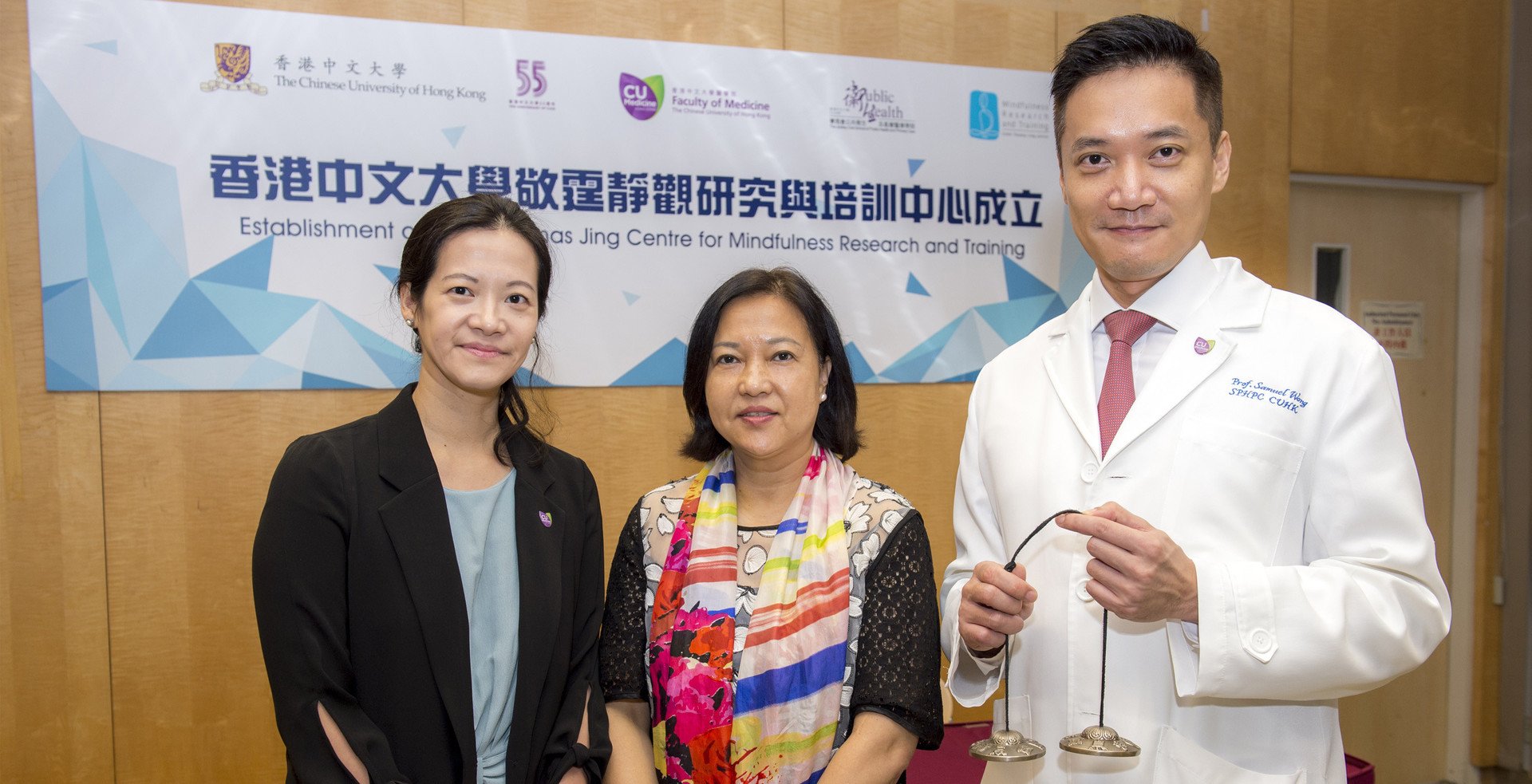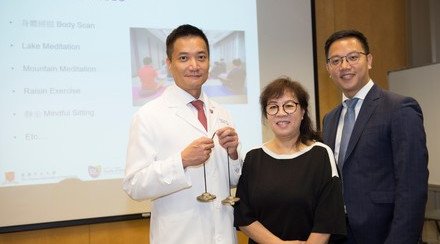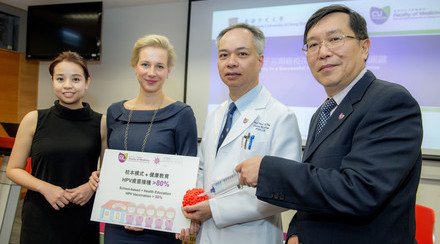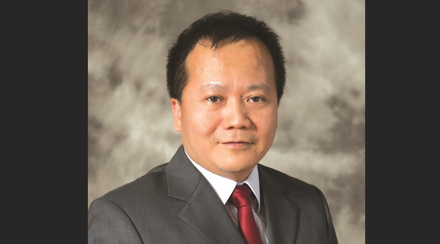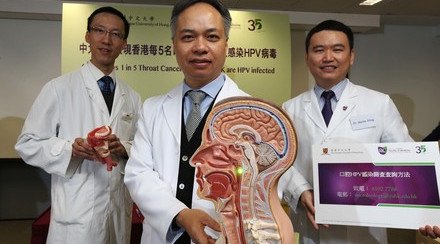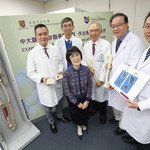CUHK Thomas Jing Centre for Mindfulness Research and Training Established
The Faculty of Medicine at The Chinese University of Hong Kong (CUHK) announces the establishment of the CUHK Thomas Jing Centre for Mindfulness Research and Training to promote health and well-being by fostering mindfulness through education, research and training. A recent study by CUHK research team revealed that mindfulness can be effective in reducing menopausal symptoms, especially anxiety and depressive symptoms.
Centre promotes mindfulness through education, research and training
Mindfulness is defined as the awareness that arises when one is paying attention, non-judgmental at that present moment. Mindfulness-based intervention is a therapeutic approach that emphasises the acceptance and awareness of present emotions, thoughts, and bodily sensations, so as to improve one’s psychological well-being. CUHK Thomas Jing Centre for Mindfulness Research and Training is the first mindfulness centre in Asia founded by a university medical school, serving both the purposes of research and training. The team’s vision is to conduct quality research which provides further evidence and support in the provision of evidence-based, mindfulness based interventions and also provides training to healthcare professionals and social workers, so as to build up professional capacity in providing mindfulness-based interventions.
Addressing the Centre’s inauguration ceremony, Professor Rocky S. TUAN,Vice-Chancellor and President of CUHK, said, “Mindfulness has its root in the East. It is an ancient philosophical idea and practice. Over the past decades, scholars in the West used scientific method to interpret the concept and produced systematic courses. CUHK is a university that embraces eastern and western cultures and the CUHK Thomas Jing Centre for Mindfulness Research and Training shares the same vision. We are delighted to have received generous support from our donor to inaugurate the first academic mindfulness research and training centre, founded by a university medical school. We wish to apply mindfulness training in medicine and healthcare and in the promotion of well-being through the establishment of this centre. CUHK has been the pioneer in the research of mindfulness in Asia. The new Centre will allow the team to generate more cutting-edge studies for various populations with specific health needs.”
Professor Samuel Yeung Shan WONG, Director of the CUHK Thomas Jing Centre for Mindfulness Research and Training and Professor of the Jockey Club School of Public Health and Primary Care, the Faculty of Medicine at CUHK, remarked, “Mindfulness training is a health intervention which has emerged in the last 40 years and remains rather a new concept in Hong Kong. Our research team has been working on different studies on mindfulness as an intervention since 2006. They include chronic pain, generalised anxiety disorder, attention deficit hyperactivity disorder, chronic stress, and insomnia. These studies have projected a positive outcome from mindfulness practice which improves patients’ psychological condition and alleviates suffering. Our future projects will include investigations on how mindfulness can become a health intervention for cancer patients, for people with substance use disorders (smoking and drug addiction), and for the elderly who often feel lonely. The new centre will provide an open, systematic platform to promote mindfulness, provide more evidence to strengthen the public’s confidence in mindfulness-based interventions through medical research, build up the professional capacity to support community and primary care services, and educate the public on mindfulness for health.”
Mindfulness helps relief menopause-related symptoms of anxiety and depression
When a woman enters menopause, the secretion of female hormones decreases gradually, leading to certain physiological and psychological changes. A recent study published by CUHK revealed that Mindfulness-Based Stress Reduction (MBSR) is more effective than Menopause Education Control (MEC) in reducing the menopause-related symptoms of anxiety and depression. The findings were published in the international scientific journal Nature – Scientific Reports.
The team enrolled 197 women between the ages of 40-60 with menopausal symptoms from 2013 to 2014. Subjects were randomised into two groups; 98 participants received MBSR and the other 99 received MEC as control.
Participants in the MBSR group were divided into 6 batches and took part in a 2.5-hour session of intervention each week. Within the eight-week training, participants underwent exercises such as sitting and walking meditation, mindful yoga and a somatically focused skill named the body scan. The MEC group received health information on the menopausal transition in combination with education, stretching exercise and discussions in small groups led by nurses.
Researchers assessed subjects at study baseline, upon completion, and 3 months and 6 months after completion of therapy via a questionnaire using the Greene Climacteric Scale (GCS). The GCS evaluates anxiety, depression, somatic symptoms, vasomotor symptoms, sexual symptoms and urogenital symptoms, a total of 24 physical and psychological symptoms.
Results showed both interventions are able to relieve menopausal symptoms. However, MBSR is more effective than MEC in reducing symptoms of anxiety and depression.
Professor WONG explained, “Mindfulness training helps peri-and post-menopausal women to be more aware of their thoughts, feelings, and bodily sensations, and helps them to cultivate a more accepting approach to their physical symptoms and limitations. Mindfulness can boost positive emotion and relieve the mental pressure coming from physical discomfort. Though menopause is not a disease, it happens in every woman with a different degree of symptoms. MBSR can help to ease the psychological symptom and we hope it can be considered as a potential intervention to help women to cope with symptoms associated with menopause.”

Study participant Ms. TO says she experienced depressive symptoms during menopause and feels fortunate to have learnt mindfulness which helps her manage emotions.
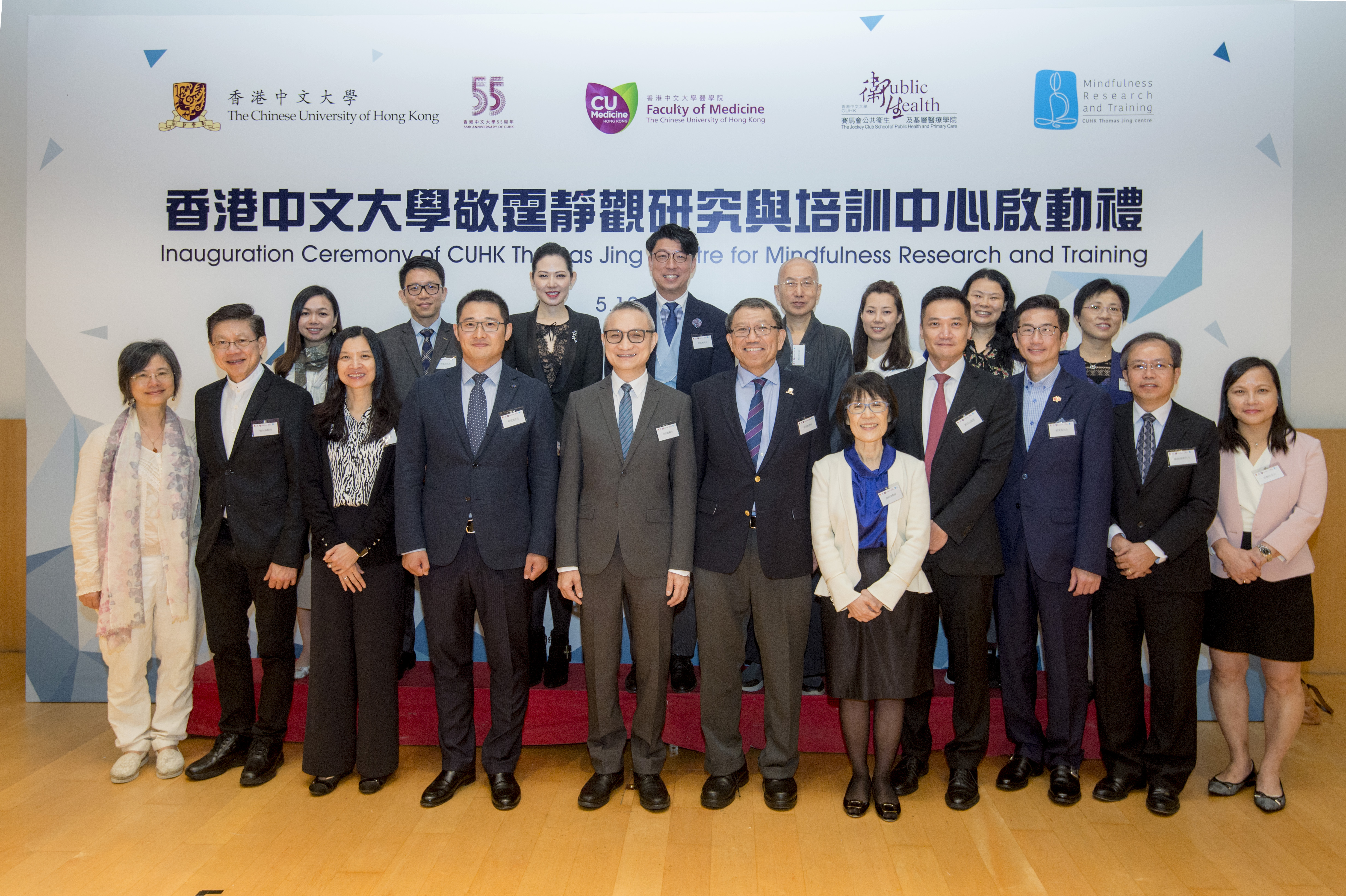
Inauguration ceremony of the Centre


